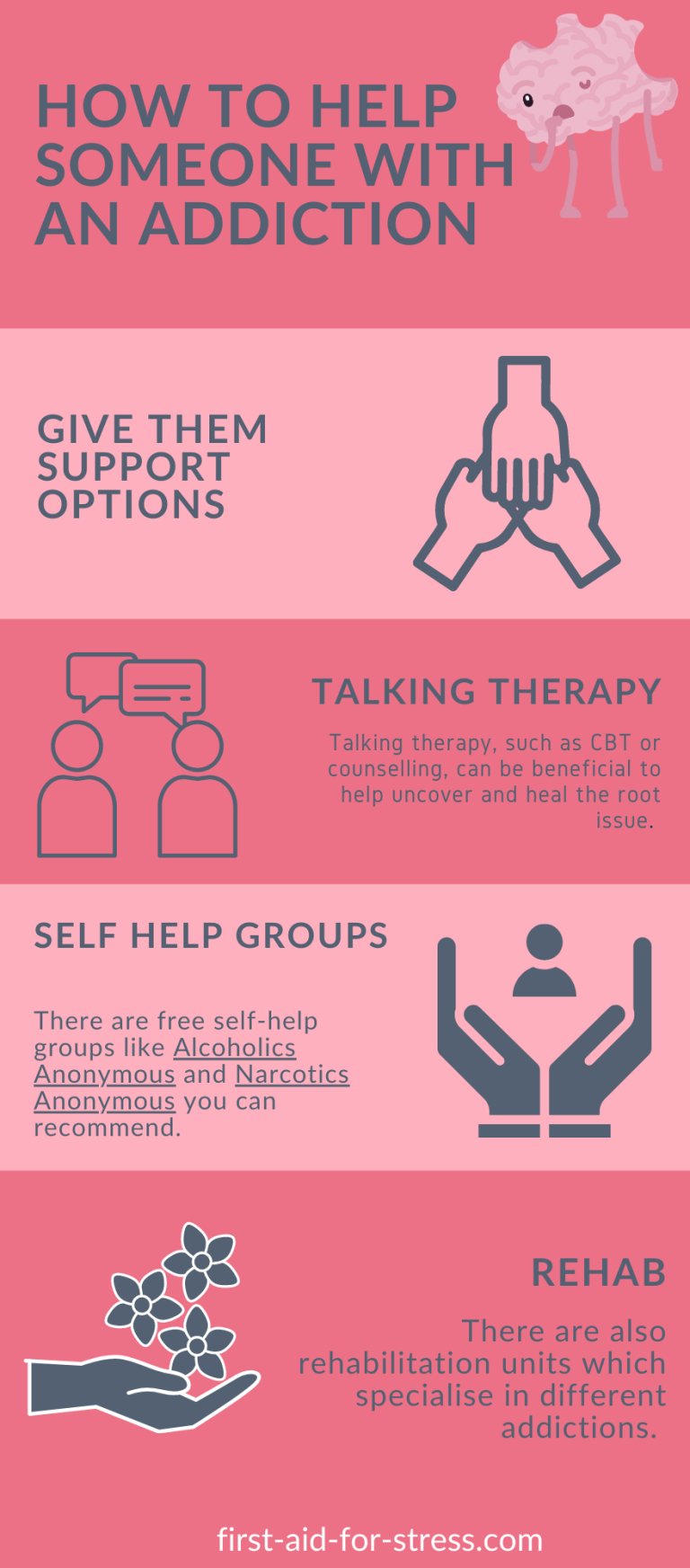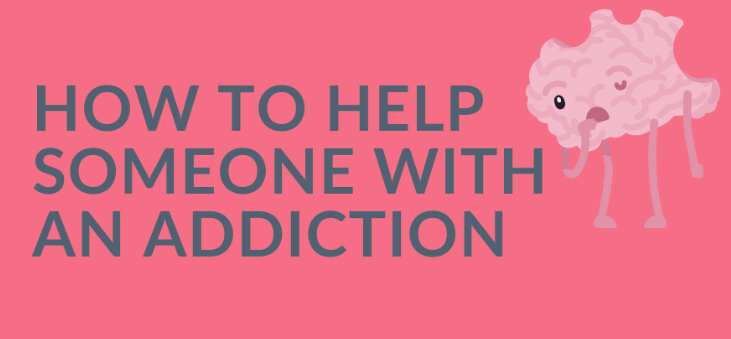Summary
Addiction is a Cycle
As someone with personal experience, if someone in your life is struggling with addiction, I know that it can be difficult to know where to turn. There is the constant worry about the wellbeing of your friend or family member, the lack of information and understanding about what addiction is and the reasons behind why they are struggling. There might also be guilt around living your own life while your friend or family member suffers.
Helping someone with an addiction is rarely a one-time thing. Addiction is a cycle that is very difficult to break. More often than not, even the addicts who go through rehab or therapy relapse several times before recovering. Some people with addiction unfortunately do not recover. They spend their whole lives trapped in the vicious cycle.
There are also many comorbidities between addiction and mental health, particularly when it comes to substance misuse disorder. Anxiety and depression are widespread. Unpaid carers who support people with an addiction have to deal with the addiction and the mental health challenges that come with it.
If this sounds like you, first of all, I want to say that I fully understand the difficult situation you are in. You are a brave and strong person despite the mixed feelings you probably feel right now about how well you are doing for your friend or family member.
Give them support Options
The main practical help you can offer your friend or family member is to show them which local organisations are available to help them recover from their addiction.
Local GP
Your local doctor is the best place to start. You can attend the appointment with your friend or family member to support them. It can be difficult to open up to your GP and be honest; however, being upfront will lead to a better treatment plan. The GP may also be able to refer your friend or family member to a local specialist organisation who can help.

Talking Therapy
Often, addiction has occurred because the individual has not had the tools to cope with an emotional problem. They may or may not be aware of the subconscious issue which has led to addiction. Talking therapy, such as CBT or counselling, can be beneficial to help uncover and heal the root issue. Talking therapy is usually offered at specialist organisations and rehab, but you can also go directly and find a local therapist.
Self Help Groups
There are free self-help groups like Alcoholics Anonymous and Narcotics Anonymous, which you can suggest. The main benefit of self-help groups is something called “common humanity,” which has many mental health benefits. Suffering from an addiction can be very lonely; as we have said before, the path is not straight.
Recovery is a process and a journey with high points and low points. Having a community of people going through this process together makes the journey more bearable and reminds the individual that they are not alone. Sometimes, it is easier to see ourselves reflected in others, and a support group offers a mirror, which is helpful for healing.
Rehab
Finally, there are also rehabilitation units which specialise in different addictions. In the UK, Rehab is funded privately, which means that this is not available for everyone, particularly if several visits are needed due to relapse.
For people who can afford this service, a lot of individual support is available at rehab. A good service will offer tailored treatment plans as well as individual and group therapy. Some centres also offer holistic services like Reiki, yoga and cold water therapy to assist recovery.
Support yourself as an Unpaid Carer
I cannot stress how important it is to support yourself as someone who is in this situation. You might be the last person on your mind; you only want to help your loved one. However, if you don’t look after yourself, your own mental & physical health can suffer.
What is most important is that you protect your mental and physical health as well as neutralise the emotions that you are feeling. Supporting someone with an addiction takes a significant toll on your well-being.
I struggled with stress, which then became anxiety and burnout. This led to Chronic Fatigue Syndrome and ME, which took years to recover from. I am not saying this to scare you but to highlight the importance of looking out for your needs.
The First Aid For Stress program I offer I wrote to help me understand addiction to better support my loved one. It was also designed to help me support my mental, physical and emotional needs.
I felt completely clueless about how I would support both of us, and this program results from a lot of research and a personal understanding of what works and what doesn’t.
How Stressed Are You?
Stress is a normal part of life. We all experience stress; however, some people are more likely to experience chronic and acute stress, making it difficult for the body to recover. Stress is experienced as tension, pressure and strain on the body as a reaction to a real or imagined threat.
The tension can be emotional, physical, mental or spiritual; it is often a combination.
I’ve put together a detailed post about the Symptoms of Stress, which breaks down the symptoms into these categories. It’s a helpful resource if you want to understand further the different symptoms you are experiencing and what could be causing them.
You will also learn more about the different types of stress, including Acute, Long Term, ACE and CUTS. I cover this content in more detail in my program; however, this is a good starting point for you to understand the important role of stress management in your well-being.
Get Your Stress Score Now
The Stress Test
The Stress test will help you understand where you are on the Perceived Stress Scale. The Stress Test will ask you ten simple questions about your thoughts, feelings and emotions over the last month, and you’ll get a score that will indicate how stressed you are.
Remember, this is just an indication; however, I have found it a really useful self-evaluation tool. Take the stress test, and I will email your score along with my 6-Part Mini Series with some highlights from the First Aid For Stress Program. You can start supporting your health and well-being immediately (for free).
The next step you can take to support yourself and your loved one is to educate yourself. Supporting someone with an addiction is not straightforward; there are three main areas I’d advise you to learn more about first.
3 Tips To Manage Your Stress
For more advice about how to manage your stress as a person who is supporting someone with an addiction watch this video where I give my top tips. These are tools you can put straight into your health & wellbeing toolbox right now.
Understand Addiction
Learning to manage my stress was just the first step.
I also found it incredibly important to learn more about addiction. I felt I could not help my family properly without understanding what we were dealing with. What I learned is that addiction is a disease. Substance Use Disorder is classified as a mental illness and treated as such.
An addiction develops over time, and once someone has become addicted, they rely on the substance or activity to make them feel normal. At the beginning of the cycle, this was not the case. When they first started taking the substance or engaging in the activity, it was for pleasure.
That’s the reason most of us do the things we do right!
We want to feel good, relax and de-stress, so we do the things that help us do that. Over time, if this cycle is repeated, the body starts to adjust. The individual begins to get less of a feeling of pleasure from the substance or activity.
This is when addiction can begin to form because the person starts to spend, watch, play, drink, smoke, snort, ingest or inject more to get the same effect. In the case of drug or alcohol addiction particularly, the body starts adjusting again. This time, the body adjusts to the chemical, so the individual feels terrible without it.
The addiction cycle has now been formed.
In the beginning, the individual tried to feel good, but in the end, the individual was trying not to feel bad.
At the end of the addiction cycle, the person is reliant on the substance or the activity; it is not simply a case of giving up; they require support and a treatment plan to help them do that.
If you’d like to learn more about addictions, I cover this in the First Aid For Stress program. I’ve found it essential to fully understand addiction to support both myself and my loved ones.
Learn about Relationship Dynamics
Finally, relationship dynamics is another area you might need to learn about if you are helping someone with an addiction. This is because, as an unpaid carer, loved one, or friend, you are more at risk of being in a toxic or manipulative relationship.
Because of the nature of addiction, an addict will put getting access to the substance or activity above all else. This includes food, water and, unfortunately, the people in their lives. This makes it incredibly difficult for friends and family trying to help. Learning about relationship dynamics, the good and the bad, is vital. You should be able to identify a toxic relationship the way situations play out and know how to set proper boundaries to protect your mental, emotional and physical well-being.
This might sound difficult, particularly if you only want to support your friend or family member. Unfortunately, there is no other way around it, and it isn’t easy to begin with. But in time, you will see the benefit and a change in the impact the addict has on you and your life. Learning about relationship dynamics will help you understand the importance of taking care of and looking after yourself first. I cover more in the First Aid For Stress program.
I hope this post has provided some helpful advice. This is a complex topic and a difficult situation to find yourself in. If you would like to work with me, you can contact me directly here. You can also get your instant stress score. Getting this is a perfect place to start.I wish you peace and much success.


